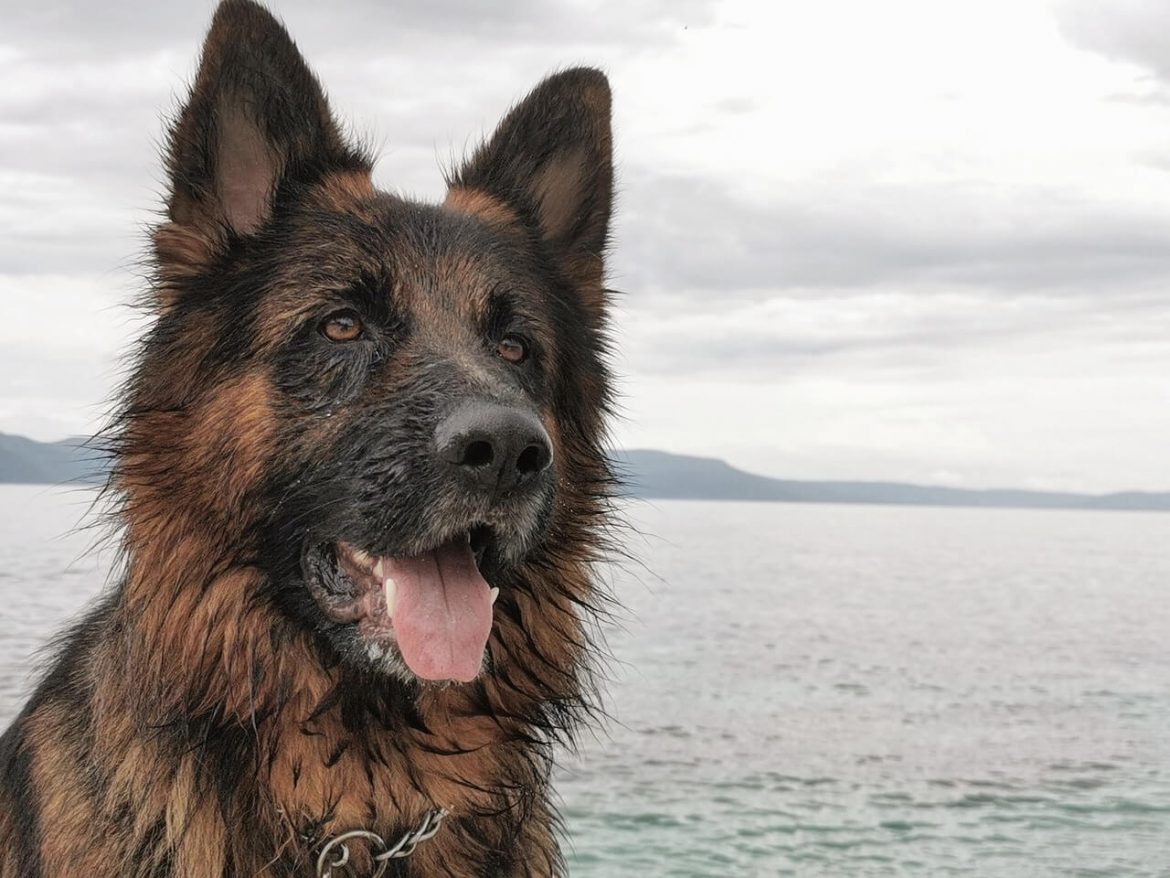Table of Contents
German Shepherds are often famed for their bravery and devotion, but they aren’t the first breed that immediately springs to mind when considering a water dog.
However, how then do German Shepherds react to water? Is it something they enjoy? Are they able to swim well?
Despite the fact that German Shepherds were not raised to be swimmers, the majority of them happily agree to spend time in the water. Their athleticism, slim physique, and inherent courage provide them with the necessary tools to succeed in the water.
Do German Shepherds like to swim?
Any German shepherd seems to be able to learn how to swim and keep it afloat in general, but whether or not they enjoy swimming is another matter. Some GSDs enjoy swimming, while others do not. This is true for all dogs, not just German shepherds.
Certain German shepherds are terrified of water, which is why they don’t enjoy swimming.
Why Might a German Shepherd like the water?
Many German Shepherds like playing in the water, despite the fact that they were not bred to swim.
What makes them so excited?
- In order to stay cool throughout the hot summer months.
Whereas the German Shepherd breed is reasonably tolerant of extreme temperatures, they will gladly utilize the opportunity to cool down on a hot day. When they get in the water, they will indeed be able to spend time and play without becoming overheated, even if it is pretty hot outdoors.
- To Exhaust Extra Energy.
German Shepherds are high-energy canines who require about 90 minutes of daily exercise. Walking, running, and fetching at the local park are all examples of ways to get some exercise.
Swimming is an especially good activity for German Shepherds. It will provide them with both the mental and physical stimulation they require.
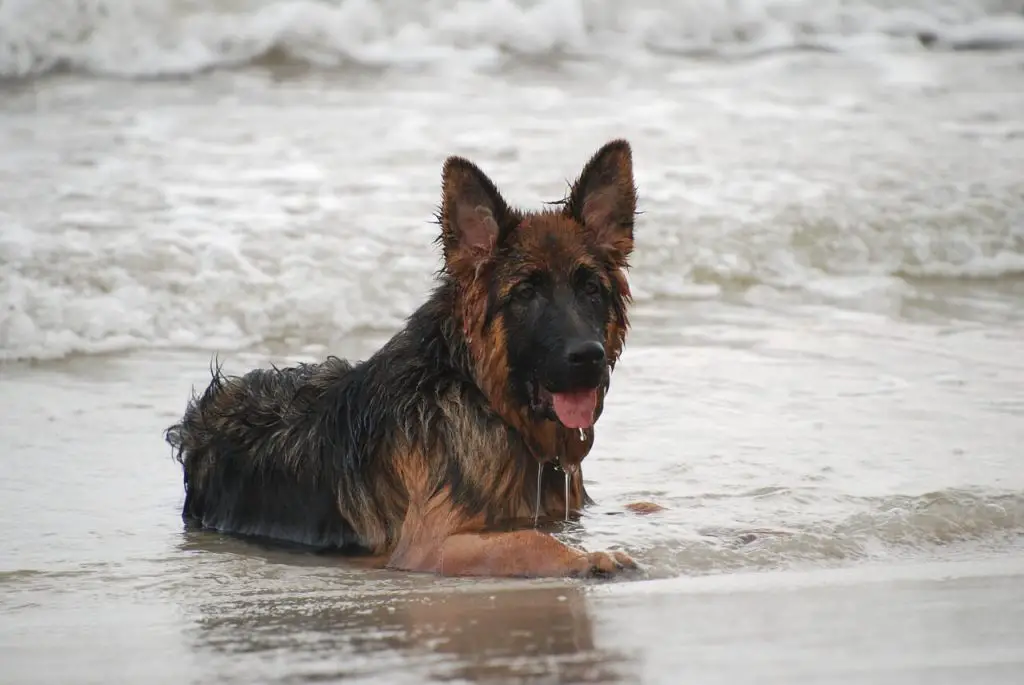
Why Might a German Shepherd Not Like The Water?
It’s impossible to generalize about German Shepherds; each one is unique and may or may not enjoy swimming. While your dog is not a fan of water, there might be reasons for their disinterest or fear of the water in the first place.
- They Didn’t Get Enough Exposure As A Puppy.
It’s no surprise that puppies are simpler to teach and affect than older, more stubborn canines. Whether the German Shepherd was not given adequate water exposure as a pup, they might well be hesitant to interact with it as an adult simply because they aren’t used to it.
However, they can still learn to appreciate the water and become proficient swimmers, but it may require a bit more patience and practice.
- They Had A Negative Water Experience.
When the German Shepherd has previously had a negative encounter with water, they might be a little more reluctant to do it in the future. If your German Shepherd used to despise bathtime or was afraid of swimming, you’ll need to undo that negative experience before they would retrain how to behave towards swimming.
Gradually start whether this is your dog. On a hot day, spray their paws with a hose or simply let them immerse their paws in a baby pool. Give them plenty of positive reinforcement to help them comprehend why this type of water is beneficial. This will set them up for a lifetime of water and swimming enjoyment.
Are German Shepherds Good Swimmers?
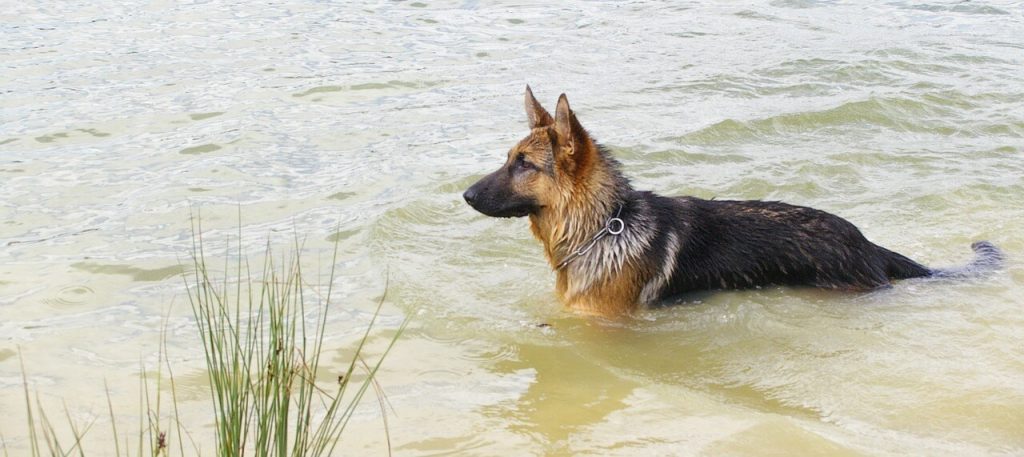
Because of their innate athleticism and fearlessness, German Shepherds can be excellent swimmers, but they are not natural-born swimmers like retrievers as well as other water dogs.
The physiological structure of a German Shepherd, on the other hand, will aid them in becoming a competent swimmer. German Shepherds possess long, powerful legs that will make swimming much easier for them. Their lengthy snouts would also assist them in swimming by keeping their heads above water, allowing them to breathe more easily.
Finally, the double coating will help them swim better. The outer layer is water repellent, so they won’t be as burdened down by the water and will be able to travel through the water much more quickly. Their inner layer also shields against the chill, allowing your German Shepherd to swim a little longer than dogs with short coats, such as pit bulls.
So, even though German Shepherds aren’t naturally designed for swimming, they may learn to swim and flourish in the water!
How to Help Your German Shepherd Enjoy the Water
- Give Them What They Want.
Is there a particular type of water your German Shepherd prefers? A kiddie pool or a sprinkler in the yard could be targeted, as could the hose you’re using to water your flowers. It could be a game of fetch in a lake’s shallows. It may be a full-blown leap into the pool’s deep end as an alternative.
Watch your German Shepherd’s body language as you introduce them to various types of water to see what they’re most comfortable with. They should be able to choose from a variety of water options.
- Freshwater should always be your first choice.
Because German Shepherds are prone to swallowing water while swimming, it is best to keep them in freshwater only. Dehydration and vomiting are also possible outcomes if saltwater is swallowed. The ocean’s waves and currents may also be too much for your German Shepherd.
- Bring Fun into the Situation.
Despite the fact that the majority of German Shepherds can easily amuse themselves in water, they still have more fun when they’re around their owners. While your dog is in the water, play with them! Play fetch in the lake, compete in the pool for the largest cannonball or chase each other in the spray. This is a great way to keep your dog occupied while they are swimming or doing other water exercises.
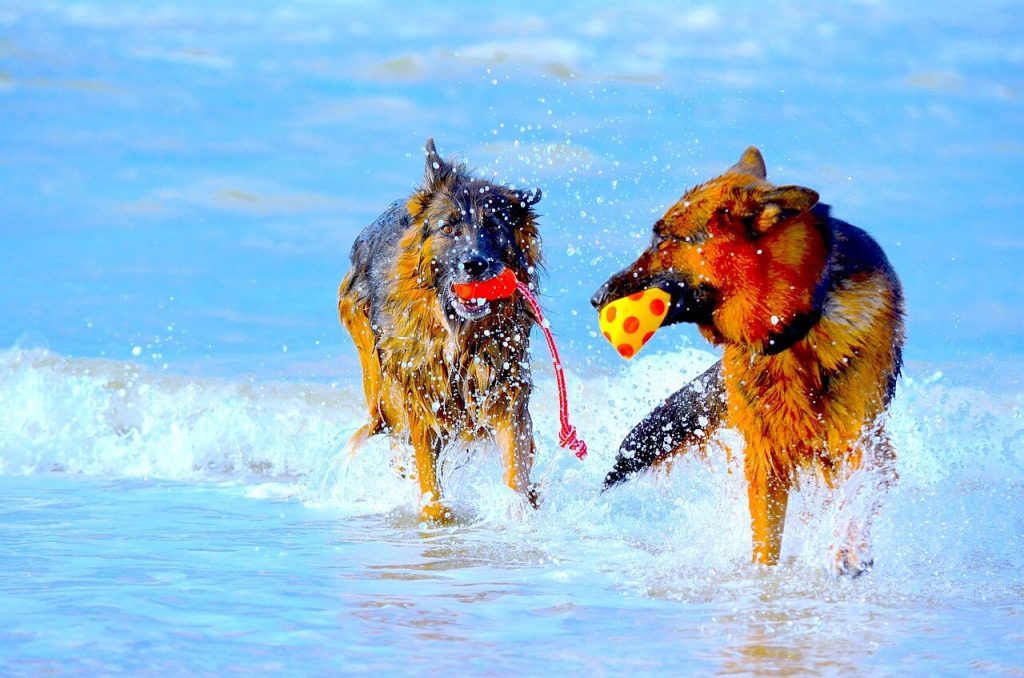
- Maintain Their Wellness.
When dogs are in water, taking water inside their ears is a regular occurrence. If water gets there, a dog’s ear canals might become infected and develop other issues. Always use a soft napkin or cotton ball to dry your dog’s ears after a swim.
If your dog is shaking their head or scratching one’s ear excessively in the days following a swim, you should consider taking them to the vet. If your dog’s ears are red and swollen, they may have an ear infection.
How To Train Your German Shepherd To Swim
Because German Shepherds are not born swimmers, you don’t have to restrict them to hoses or child-sized swimming pools. Getting your German Shepherd into the water isn’t as difficult as you would think.
- Make It Easier For Them To Acclimate To The Water.
Your German Shepherd may take some time to get used to getting wet if they have never been in the water before. They should be encouraged to get their paws in and play around.
At first, they’ll probably prefer keeping their feet firmly on the ground. The more time you spend in the water beside them, the better. As a result, they will feel more at ease with the concept.
- Encouragement in the form of positive feedback is essential.
It’s a good idea to reward your German Shepherd if they get into the water and start playing about. Provide plenty of praise and recognition and head pats whenever your German Shepherd gets into the water to encourage them.
- Make Certain They Have A Life Jacket and Do Not Keep Them Alone In The Water.
You’ll want to keep this as simple as possible for your dog whenever it comes to swimming. Your dog should be able to swim in a calm place where he can get used to the water. Your dog may fear or struggle if they encounter currents in rivers, creeks, or other waterways.
As an added bonus, a canine life jacket will keep your German Shepherd afloat while they’re training, so it will undoubtedly save them when they begin to feel tired or struggle.
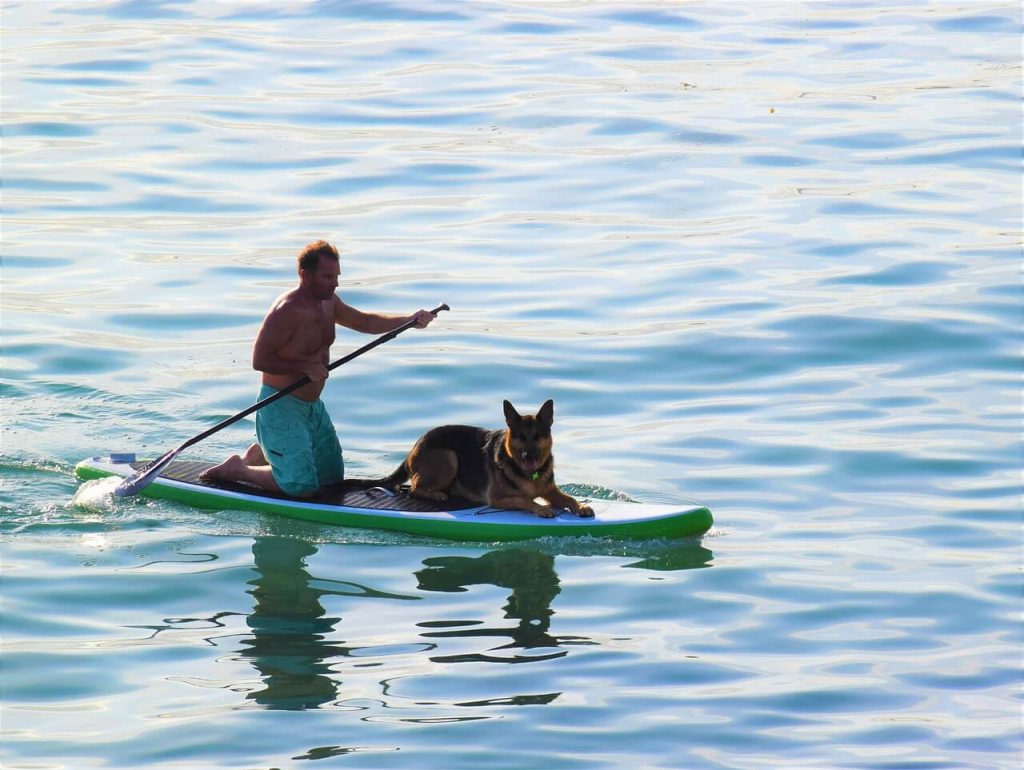
- Give Them a lot of time and practice.
Swimming is a long-term commitment. It will take a lot of practice for German Shepherds, which are not natural swimmers, to understand how to swim well. Please make sure that they are swimming with all four legs to propel themselves through the water and that they can maintain their heads above water while doing so.
Making a game of it, like fetch or making them chase you, might assist.
Games like this will not only keep them interested, but they will also divert their attention away from swimming, forcing them to swim more naturally. After some practice, your German Shepherd will be able to float without any effort on your part.
Frequently Asked Questions about German Shepherd Swimming Abilities
Can German Shepherds Swim?
This question does not have a precise answer. German shepherds, on the other hand, can swim in general. It’s simply an issue of whether they like or dislike water that decides whether or not they could be taught.
Are German Shepherds Natural Swimmers?
Since German shepherds are agile and skilled swimmers, they can swim. They really aren’t, however, natural swimmers. They were not designed for swimming, unlike some other breeds.
On the other hand, German shepherds can become excellent swimmers with enough effort and training. Despite this, they cannot acquire the same degree of swimming as natural swimmers.
Labrador and Golden Retrievers are excellent natural swimmers.
Why is my German Shepherd afraid of the water?
It really is controversial.
Sometimes dogs have had quite a bad experience in or near water, and as a result, they have learned to fear water. Other dogs may simply be uncertain about what to do or whether or not the water is okay.
Can You Breed Natural Swimmer German Shepherds?
Certain German shepherds have natural swimming abilities. However, these dogs represent mixed breeds. In a nutshell, it’s all about genes.
If you’re wondering whether or not German shepherds possess webbed feet, the reply would be no. They lack the necessary genetics.
Labrador and Golden Retrievers, on the other hand, have these characteristics. So, if you cross them with a German shepherd, you’ll get a German shepherd dog that is a natural swimmer.
There are numerous other characteristics that a natural swimmer breed possesses. This includes things like leg length, coat length, and more. You can still train your GSD to swim in either case.
Do German Shepherds Have Webbed Feet?

A dog’s webbed feet indicate that there is tissue connecting every one of its toes. Since all dogs’ feet contain padding and some tissue at the bottom of each toe, dogs having fully webbed feet have skin connecting every one of their toes.
Webbed feet, which help transfer water more efficiently than non-webbed feet, can indicate a natural swimming ability.
Webbed feet are not present in a pure German Shepherd, as they are in a retriever or a water canine. They do have some connective skin among their toes, but it isn’t long enough to be called totally webbed.
Even if they don’t have webbed feet, they can learn to swim successfully. It merely goes to demonstrate that the German Shepherd was not bred to work in the water.
Can German Shepherds Swim in Pool?
Absolutely, German shepherds could swim in a pool, though not for long, specifically if the water is heavily chlorinated, as in a public pool. The chlorinated water will dry up your GSD’s coat, creating irritation to the skin and eyes.
Can German Shepherds Swim in Cold Water?
Swimming too much in cold water can cause hypothermia in dogs, just as it can in humans. Since your dog won’t grasp that the cold comes from the water, it’s up to you to determine if the water is just too cold for them. If indeed the water is too chilly for you to stay in to dip in, it is likely too cold to the German Shepherd too.
How long Can a German shepherd Swim?
This varies from dog to dog, but in general, well-taught German shepherds might be able to swim for 30 to 45 minutes at a time with no difficulty.
